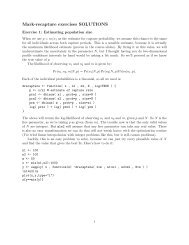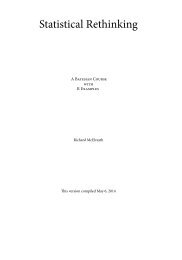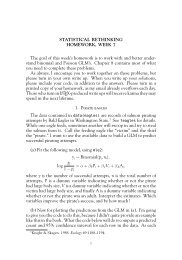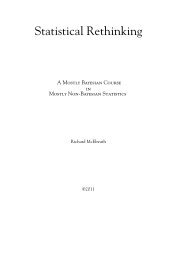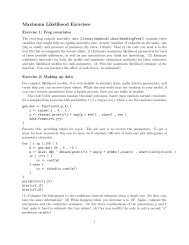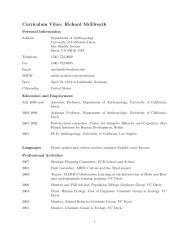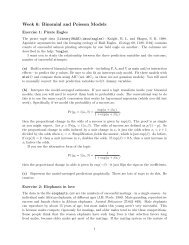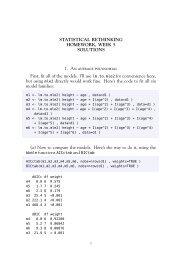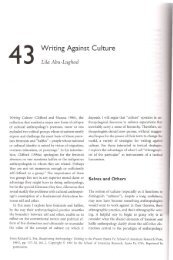the relation of habitual thought and behavior to language
the relation of habitual thought and behavior to language
the relation of habitual thought and behavior to language
Create successful ePaper yourself
Turn your PDF publications into a flip-book with our unique Google optimized e-Paper software.
RELATION OF HABITUAL THOUGHT AND BEHAVIOR TO LANGUAGE<br />
erality <strong>of</strong> statement is conveyed through<br />
<strong>the</strong> verb or predica<strong>to</strong>r, not <strong>the</strong> noun .<br />
Since nouns are individual already <strong>the</strong>y<br />
are not individualized ei<strong>the</strong>r by typebodies<br />
or names <strong>of</strong> containers, if <strong>the</strong>re is<br />
no special need <strong>to</strong> emphasize shape or<br />
container. The noun itself implies a suitable<br />
type-body or container . One says, not<br />
'a glass <strong>of</strong> water' but ke.yi 'a water,' not<br />
'a pool <strong>of</strong> water' but pa.he, 4 not 'a dish<br />
<strong>of</strong> corn-flour' but ngemni 'a (quantity <strong>of</strong>)<br />
corn-flour,' not 'a piece <strong>of</strong> meat' but sik"i<br />
'a meat .' The <strong>language</strong> has nei<strong>the</strong>r need<br />
for nor analogies on which <strong>to</strong> build <strong>the</strong><br />
concept <strong>of</strong> existence as a duality <strong>of</strong> formless<br />
item <strong>and</strong> form. It deals with formlessness<br />
through o<strong>the</strong>r symbols than nouns .<br />
Phases <strong>of</strong> Cycles in SAE <strong>and</strong> Hopi<br />
Such terms as summer, winter, September,<br />
morning, noon, sunset, are with<br />
us nouns, <strong>and</strong> have little formal linguistic<br />
difference from o<strong>the</strong>r nouns . They can be<br />
subjects or objects, <strong>and</strong> we say 'at' sunset<br />
or 'in' winter just as we say at a corner<br />
or in an orchard .5 They are pluralized <strong>and</strong><br />
numerated like nouns <strong>of</strong> physical objects,<br />
as we have seen. Our <strong>thought</strong> about <strong>the</strong><br />
referents <strong>of</strong> such words hence becomes<br />
objectified . Without objectification it<br />
would be a subjective experience <strong>of</strong> real<br />
time, i .e. <strong>of</strong> <strong>the</strong> consciousness <strong>of</strong> 'becoming<br />
later <strong>and</strong> later'-simply a cyclic phase<br />
similar <strong>to</strong> an earlier phase in that everlater-becoming<br />
duration . Only by imag-<br />
' Hopi has two words for water-quantities ;<br />
ke .yi <strong>and</strong> pa-he. The difference is something<br />
like that between 's<strong>to</strong>ne' <strong>and</strong> 'rock' in English,<br />
pa-he implying greater size <strong>and</strong> 'wildness' ;<br />
flowing water, whe<strong>the</strong>r or not out-doors or in<br />
nature, is pa-be, so is 'moisture .' But unlike<br />
's<strong>to</strong>ne' <strong>and</strong> 'rock,' <strong>the</strong> difference is essential,<br />
not pertaining <strong>to</strong> a connotative margin, <strong>and</strong> <strong>the</strong><br />
two can hardly ever be interchanged .<br />
'To be sure <strong>the</strong>re are a few minor differences<br />
from o<strong>the</strong>r nouns, in English for instance in<br />
<strong>the</strong> use <strong>of</strong> <strong>the</strong> articles .<br />
2 03<br />
ination can such a cyclic phase be set beside<br />
ano<strong>the</strong>r <strong>and</strong> ano<strong>the</strong>r in <strong>the</strong> manner<br />
<strong>of</strong> a spatial (i .e . visually perceived) configuration.<br />
But such is <strong>the</strong> power <strong>of</strong> linguistic<br />
analogy that we do so objectify<br />
cyclic phasing . We do it even by saying<br />
'a phase' <strong>and</strong> 'phases' instead <strong>of</strong>, e .g.,<br />
'phasing.' And <strong>the</strong> pattern <strong>of</strong> individual<br />
<strong>and</strong> mass nouns, with <strong>the</strong> resulting binomial<br />
formula <strong>of</strong> formless item plus<br />
form, is so general that it is implicit for<br />
all nouns, <strong>and</strong> hence our very generalized<br />
formless items like 'substance,' 'matter,'<br />
by which we can fill out <strong>the</strong> binomial<br />
for an enormously wide range <strong>of</strong> nouns .<br />
But even <strong>the</strong>se are not quite generalized<br />
enough <strong>to</strong> take in our phase nouns . So<br />
for <strong>the</strong> phase nouns we have made a<br />
formless item, 'time.' We have made it<br />
by using 'a time,' i .e. an occasion or a<br />
phase, in <strong>the</strong> pattern <strong>of</strong> a mass noun, just<br />
as from 'a summer' we make 'summer' in<br />
<strong>the</strong> pattern <strong>of</strong> a mass noun . Thus with our<br />
binomial formula we can say <strong>and</strong> think<br />
'a moment <strong>of</strong> time,' 'a second <strong>of</strong> time,'<br />
'a year <strong>of</strong> time.' Let me again point out<br />
that <strong>the</strong> pattern is simply that <strong>of</strong> 'a bottle<br />
<strong>of</strong> milk' or 'a piece <strong>of</strong> cheese.' Thus we<br />
are assisted <strong>to</strong> imagine that 'a summer'<br />
actually contains or consists <strong>of</strong> such-<strong>and</strong>such<br />
a quantity <strong>of</strong> 'time .'<br />
In Hopi however all phase terms, like<br />
summer, morning, etc ., are not nouns but<br />
a kind <strong>of</strong> adverb, <strong>to</strong> use <strong>the</strong> nearest SAE<br />
analogy. They are a formal part <strong>of</strong> speech<br />
by <strong>the</strong>mselves, distinct from nouns, verbs,<br />
<strong>and</strong> even o<strong>the</strong>r Hopi 'adverbs.' Such a<br />
word is not a case form or a locative pattern,<br />
like 'des Abends' or 'in <strong>the</strong> morning.'<br />
It contains no morpheme like one<br />
<strong>of</strong> 'in <strong>the</strong> house' or 'at <strong>the</strong> tree.'e It means<br />
'Year' <strong>and</strong> certain combinations <strong>of</strong> 'year'<br />
with name <strong>of</strong> season, rarely season names alone,<br />
can occur with a locative morpheme 'at,' but<br />
this is exceptional . It appears like his<strong>to</strong>rical<br />
detritus <strong>of</strong> an earlier different patterning, or<br />
<strong>the</strong> effect <strong>of</strong> English analogy, or both .



